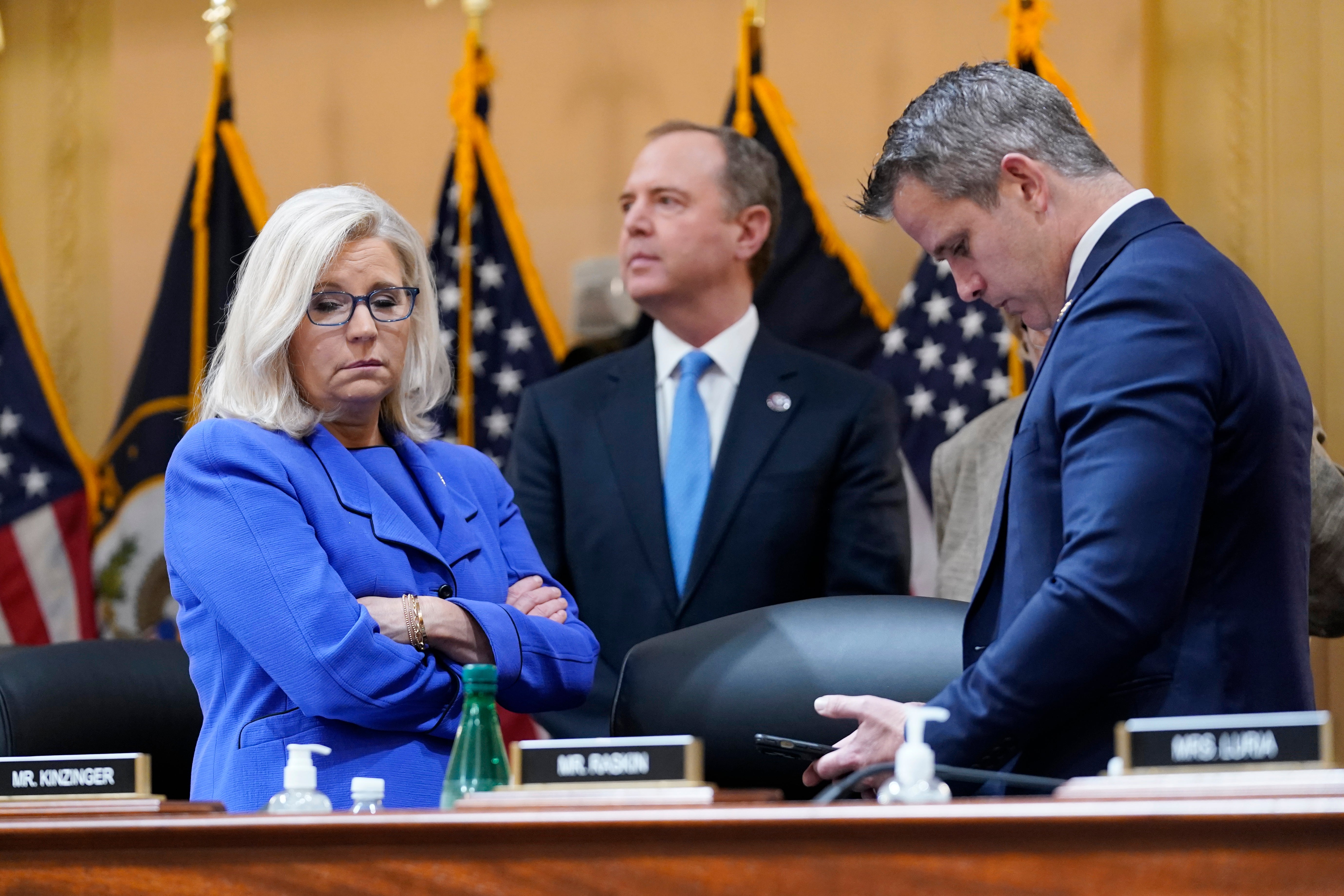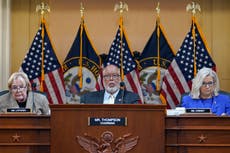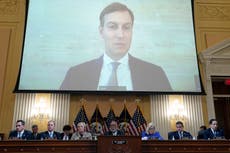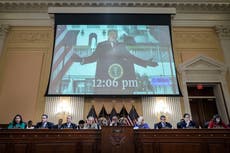Who asked Trump for a Jan 6 pardon? Speculation spreads as Cheney accuses own colleagues
Select committee vice-chair Liz Cheney is raising allegations that multiple Republican House members sought pardons after the January 6 attack on the Capitol. Andrew Feinberg reports on the fallout


Wyoming Representative Liz Cheney’s presentation during Thursday’s House January 6 select committee hearing has renewed speculation regarding the extent to which her colleagues in the House Republican Conference played a role in the violent attack on the Capitol and whether any might face criminal charges as a result.
Ms Cheney, the select committee’s vice-chair, delivered a bombshell during her opening remarks when she revealed that an untold number of House Republicans pressed then-president Donald Trump to grant them pardons in the days following the worst attack on the Capitol since the War of 1812.
She said one House member, Pennsylvania Representative Scott Perry, reached out to the White House seeking a pardon in the weeks between the attack and the expiration of former president Donald Trump’s term on 20 January 2021.
Mr Perry, who though a spokesperson called his colleague’s accusation “a laughable, ludicrous and a thoroughly soulless lie,” had played a leading role in a scheme in which Mr Trump would have replaced then-acting attorney general Jeffrey Rosen with a loyalist, Jeff Clark.
Ms Cheney said Mr Trump “wanted Mr. Clark to take a number of steps,” including “sending [a] letter to Georgia and five other states, saying the U.S. Department of Justice had ‘identified significant concerns that may have impacted the outcome of the election”.
The contents of the letter, she said, were “a lie”.
Mr Clark invoked his Fifth Amendment right against self-incrimination during a deposition before the select committee, but Mr Perry has refused to appear and has lashed out at the panel, calling it “illegitimate”.
But Mr Perry was not the only House Republican who contacted the White House seeking clemency following the attack.
Continuing, Ms Cheney revealed that “multiple other Republican congressmen” contacted the White House in the waning days of the Trump administration in hopes of obtaining pardons for unspecified actions which they believed left them open to being charged with crimes.
Ms Cheney did not reveal who else among her colleagues sought pardons following the insurrection, but other figures involved with the events of January 6 have put several names into circulation.
Ali Alexander, the right-wing operative and provocateur who organised one of the “Stop the Steal” rallies that took place near the Capitol that day, has said publicly that he worked with two Republican representatives, Mo Brooks of Alabama and Paul Gosar of Arizona.
Both have denied any coordination with Mr Alexander, but Mr Brooks was also one of the speakers at the White House rally which preceded the riot, telling attendees it was time to “start … kicking ass”.
Another GOP House member who might have sought a pardon is Representative Barry Loudermilk of Georgia.
Last month, the select committee requested that Mr Loudermilk gave evidence regarding a tour he allegedly led on 5 January 2021, the day before the attack on the Capitol.
New Jersey Representative Mickie Sherrill and 33 other Democrats alleged in a January 2021 letter that “visitors” they encountered taking tours the day before the riot “appeared to be associated” with the White House rally at which Mr Trump urged his supporters to “fight like hell” just before a group of them began assaulting Capitol Police, and noted that the rioters “seemed to have an unusually detailed knowledge of the layout of the Capitol Complex”.
Although the Capitol and the House and Senate office buildings connected to it are notoriously difficult to navigate, the mob of Mr Trump’s supporters appeared to move about the labrynthine complex with ease after entering through broken windows and forced doors.
Members of the violent extremist group known as the Oath Keepers appeared to be familiar with the byzantine network of tunnels which runs beneath the Capitol and its adjacent office buildings.
In court documents, prosecutors have alleged that one member of the group sent an encrypted message during the attack which told co-conspirators that lawmakers were “in the tunnels under the capital [sic]” and urged the recipient to “seal them in” and “turn on gas”.
Another message sent as House members were being relocated to a secure location informed the accused insurrectionist that “all legislators” were “down in the tunnels, [three] floors down”.
Rioters were also able to find their way to the private offices of some high-ranking lawmakers — colloquially known as “hideaways” — even though the doors of such offices are unmarked and their locations closely-guarded.
In May 2021, Mr Loudermilk led a group of Republicans on the House administration committee who filed an ethics complaint against Ms Sherril and strenuously denied allegations that any member had led “reconnaissance tours” of the complex.
But the select committee’s letter to Mr Loudermilk noted that the panel had reviewed evidence which “directly contradict[ed]” his denial of having led any tours. He later claimed that the tour he led was merely a group of constituents.
Representatives for Mr Brooks, Mr Gosar and Mr Loudermilk did not immediately respond to requests for comment from The Independent.
Under Article II of the US Constitution, presidents have power to “grant Reprieves and Pardons for Offenses against the United States, except in Cases of impeachment,” meaning any crime that could be prosecuted in federal courts.
This power, which has roots in the British sovereign’s ability to pardon offenders, has also been used by past presidents to preempt prosecutions before any charges have been brought.
Two famous instances of preemptive pardons were issued by President Gerald Ford, who pardoned Richard Nixon for “all offenses against the United States which he ... [had] committed or may have committed or taken part in during the period from January 20, 1969 through August 9, 1974” even though Nixon had not been indicted, and by President Jimmy Carter, who in 1977 granted a blanket pardon to any American who had illegally evaded the military draft during the Vietnam War.
Accepting a presidential pardon after conviction absolves a person of any penalties that may have been imposed, such as prison sentences or denial of his or her right to vote or own firearms.
Accepting a preemptive pardon means that a person cannot be prosecuted in federal court for a given offense.
But under US law, accepting a pardon — even a preemptive one — means a recipient is also admitting having committed the crime for which they are receiving it.
Democratic Representative Eric Swalwell pointed out this fact on Twitter shortly after Ms Cheney made the bombshell accusation, writing: “If you did nothing illegal, why would you need a pardon?”
His onetime colleague, former Illinois GOP Representative Joe Walsh, also weighed in, writing: “Multiple House Republicans sought pardons from Trump. Can’t stop thinking about this”.
And Missouri Representative Cori Bush, one of the lawmakers who attended Thursday’s hearing, told The Independent “whoever, even representatives” need to be “held accountable” if they were “a part” of the violence that day.
“They should be investigated, if they were part of this, they should be expelled because that is section three of the 14th Amendment”, she said. referring to the section of the US Constitution which prohibits anyone who “engaged in insurrection or rebellion” against the United States from holding any federal office.
“They should not be in office. And then, depending on what they did, if it has to go further, then they should be prosecuted,” she added.
Steve Vladek, a University of Texas law professor who is an expert on federal courts, made a similar observation a short time later.
“The headline is that multiple GOP congressmen sought pardons from President Trump. But the story is why they felt the need to do so,” he wrote.
Eric Garcia contributed reporting
Join our commenting forum
Join thought-provoking conversations, follow other Independent readers and see their replies
Comments



Bookmark popover
Removed from bookmarks